BIZ TIP TUESDAY:
SHOULD I PAY FOR NOTES?
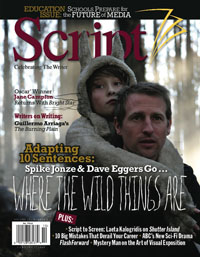
Full disclosure - I have read scripts for money. For a long time I read my friend's scripts (for free, of course) and gave them feedback... that's basically where my book came from. But after the book came out, people kept asking me to read their scripts. Total strangers! You know, I have this little side job called writing movies. At the time I was having a couple of scripts hit the screen every year and hardly had time to write all of my specs, let alone read someone else's! But after a couple of years of getting hammered by requests, I caved... and picked a price I thought everyone would say "no" to and leave me alone... but still had to read some scripts. Though some of the scripts were pretty good, many were very bad... they read like first drafts of first scripts. So I raised my price so high that I didn't think anyone could afford me and posted that I did not want to read first scripts or first drafts... And *still* got a whole lot of very bad scripts (and a couple of good ones). I'm afraid I was more of a Script Insultant than Script Consultant - after reading so many bad scripts I was sure I was getting permanent brain damage! Since I never wanted to read scripts for money in the first place, I stopped cold. Hey, more time to write *my* scripts!
So, I will not read your script for money... but there are plenty of other people who will. Should you pay them?
Call me cheap or call me cautious, but the only reason why I would hire someone to give me notes is to find the problems I don't know exist. Which means I would try to do everything possible to get feedback for free before I paid someone. Paying for notes would be the last thing I would do - which doesn't mean I wouldn't ever do it, I would just do all of the other stuff first. What other stuff?
ONLINE

If you are just starting out, and this is your first or second script, I'd suggest you start by swapping scripts with people online. There are some "peer review groups" online like Zoetrope, Trigger Street, Greenlight and Helium, and though you're going to get reviews from people who may not know anything, they will at least be people who have read your script and can tell you where they were confused and where they got bored. I think the key with sites like this is to weed out the people who don't know what they are talking about to find those who do - and then seek those people out with each rewrite or new screenplay.
You may think the bad news with sites like this is that you also have to read their scripts, including the idiot's - but you'd be surprised at how much you can learn from other people's mistakes. Learning to analyze other people's scripts and try to pinpoint the exact problems and explain them will train your brain to see problems in your own script. You can actually learn how to write good scripts from reading bad ones... you just can't read *only* bad scripts, or your head will explode. Just as you are searching for the people who give intelligent feedback on your script, others are looking for the same, and eventually you find the folks who are not idiots and you swap scripts with them either through the system or outside the system by e-mail. You are finding people at your level (or maybe a step ahead of you) and forming an online friendship with them. You swap scripts and if you have some screenwriting epiphany you pass it around so that everyone else learns.
I have "friends" online from all over the world that I have never met, and you probably do, too. You want to find friends who share your interest and passion in screenwriting and help each other out by swapping scripts. Oh, and you can swap produced scripts and contact information and anything else that will eventually lead you to a sale.

Done Deal's website has a section where you can post a couple of pages of your screenplay and have them torn apart - and that may help you with the small stuff (the writing part, rather than the story part). There are so many different elements of screenwriting that are important, you may have the general story stuff under control but your writing is confusing or boring or has some other problem that someone can help you with.
When you get feedback from people who may know only as much as you, you have to skip anything that's "how they would write the script" and focus on places where they got confused or didn't understand what you were doing - the places where your script didn't communicate what was in your mind. But if everyone who reads your script says that the same thing didn't work for them - it doesn't work... fix it. Usually when people have some weird idea of how they would write the story, it may mean that the story just didn't do it for them at some point. So ask yourself *why* and look at that point in your script.
One of the issues with zoetrope (and many other places) is that you often get folks who don't know what they are talking about doing a lot of talking. It's common for a new writer who has a flaw in their work to forgive that same flaw in the work of others... or even see it as brilliance (because that flaw is something they do, and they are brilliant). This creates warped feedback where the good parts of scripts can be seen as bad and the bad parts seen as good. One thing to do is compare your script to the majority of produced scripts (not the exceptions) to see how it holds up.
But never discount a note because you don't like it - those are always the good ones. The ones that tell you you're brilliant are the ones to disregard.
Though I'm not going to read your script, asking people here (on the message boards) probably isn't a bad idea. You can swap electronic copies and give notes by e-mail.
SCREENWRITING GROUPS

Join a writer's group and swap scripts. The personal, face-to-face version of online script swapping. Here in Los Angeles there are a bunch of small screenwriting groups that meet and swap scripts or read scripts aloud in the group for comments. Many of these groups are looking for new members (new blood) and advertize on screenwriting message boards and Craig's List and bulletin boards at coffee shops. I'm a longtime member of the Scriptwriters Network in Los Angeles, and they have both smaller groups that meet in different neighborhoods around Los Angeles (and maybe the world - there are members all over, now) and a program called Triads (which is not to be confused with Asian Crime Gangs) where three screenwriters swap scripts with each other and then give each other feedback. The great thing about the Triads is that you get two people's feedback on your script, and it's often more comfortable to tell someone what's wrong with their script if there's another person also giving them feedback - even if it just supplies a referee when the fists start flying.
There are probably screenwriting groups almost everywhere, many Barnes & Noble bookstore and Borders bookstores have groups that meet once a week - and there's usually a screenwriting group. I believe there's one in my podunk hometown. And if there's *not* a screenwriting group in your area? Start one! Post a note somewhere, put an ad on Craig's List, go down to your local bookstore or community college or just walk around with a cardboard sign. Sometimes people are just waiting for someone to start a group - so start one! The purpose of feedback is a different pair of eyes - someone who sees what you may have missed. I can read a script a dozen times and never spot that typo on page 7... someone else sees it right away. Feedback helps you with your next rewrite. Sometimes just hearing your words aloud when you are reading your script to others points out some of the problems.
TRUSTED FRIENDS

Eventually you want to build a network of trusted friends. People who share your sensibilities and are on the same road to success as you are, and swap scripts with them. These people will continue to give you feedback on your screenplays even after you are writing professionally. Back in the 70s, this group of screenwriters and directors known as The Movie Brats used to offer feedback on each other's scripts and films. So this guy name Martin Scorsese would screen a rough cut of his film for a bunch of friends including this guy named Steven Spielberg and this guy named Paul Schrader and this guy named Brian DePalma and... I have no idea what kind of feedback they gave each other, but you've probably heard of all of these guys, right?
These days we have a new crew of writer-directors who show each other rough cuts and scripts, including Tarantino and Rodriguez and Roth and Rockwell and several others. The directors seem to be easier to spot than screenwriters, because they often show up in each other's films and talk about getting ideas or feedback from each other. But most professional screenwriters have a couple of trusted friends they let read their scripts before they unleash them into the world.
If your friends don't read, you need to make some new ones. Wherever you live there are other people there who write and maybe even some who write scripts. From online, I know a guy who lives in the wilds of Alaska... and writes scripts. So, even if you live on Jupiter there is probably someone near you who is writing scripts or novels or even making short films. Find those people!
As writers, we tend to be hermits - bad idea. It takes you out of the world we are writing about, away from people (all stories are about people) and deadends just about every career plan you may have. You need to mingle. You need to seek out people with similar interests. You need to assemble your team!
STAGED READINGS

As we climb up the ladder of experience, from folks you swap scripts with at Zoetrope to writing groups to trusted friends, you are (hopefully) getting better notes that will fine tune your screenplay. The more people know about screenwriting, the better the quality of their feedback. Reading your script outloud in a writer's group will point out some performance problems, but a staged reading will suddenly turn your words into... well, kind of a stageplay with bad blocking. Real actors reading your lines will make them sing or drop like a stone, and you can see where things that looked great on paper don't quite work in real life. There are screenwriting groups in Los Angeles that have partnerships with acting groups, to do staged readings of new scripts.
But just like everything else, if you don't have something like this where you are - start it yourself! Find the closest community theater group and ask if they'd like to practice their cold reading skills with your screenplay. Everybody wins. The community theater group gets to practice their acting and you get to hear what your dialogue sounds like coming from the mouths of actors. Plus, you get to network a little, and meet some local actors.
COVERAGE vs. DETAILED NOTES

Let's say you've gone through most of these steps and you'd still like a professional opinion - you want to pay for notes. The first thing I would do is all of the free stuff and make sure your script is "perfect" in your eyes, so that the folks you pay can only find flaws you've missed. You don't want to pay for someone to give you notes on the obvious - one of the problems I had with some of the scripts that I read for money was that many had completely basic problems that should have been corrected before they ever got to me. I'm not just talking about spelling and typos (my spelling is so bad, I can't complain), I'm talking about very very basic formatting issues. People sent me screenplays in stage play format, and some sort of novel/screenplay hybrid format. It was as if they had never even seen a screenplay before. That meant instead of my giving notes on story and character, most of my notes were basic screenwriting instruction. What a waste of my time and their money!
Do you know the old joke about the guy whose car breaks down, so he calls a tow truck, and when he finds out the tow truck charges an outrageous amount per mile, he puts the brakes on in order to get his money's worth...
That's the logic behind paying for notes when your script isn't absolutely the greatest it can be. You end up paying a lot of money to get the same exact feedback you'd get at someplace like Zoetrope for free. That's why you want to start with all of the free stuff first, and do as many rewrites as you can so that the consultant is giving you fine tuning notes rather than basic stuff.
COVERAGE

There are two types of feedback you can pay for - coverage and detailed notes (consulting). Coverage is what a studio reader does - usually a couple of pages of synopsis and a couple of pages of analysis, and the "box scores" that rate some basic aspects of your screenplay. You may think the synopsis part is a waste of time, but that's often what points out what you have written vs. what you *think* you have written. Problems with the basic story can often be found in the synopsis - if the reader thought you were going for one thing when you were really going for something else. Or if they completely misunderstand some aspect of your story. Or if they have no idea who your lead character is or what the genre is... If your story isn't clear enough to the reader that they can't figure out what it's about, you need to clarify things. The analysis part may be brief, but it will give you all of the problems and weaknesses of your script.
The good thing about coverage is that you are probably getting it from the same reader who would cover your script for a producer or studio. These folks do coverage for screenwriters on the side, so it's like insider info - seeing what the producer or studio would think of your screenplay. Coverage is also fairly inexpensive, since most of these folks make their living reading scripts for producers and this is just a sideline. Though I have never used Scott The Reader's notes service, I know him and he's a good guy (who would probably be the guy covering your script if you sent it to any of a number of mini-majors and high end producers. Recently on Done Deal a bunch of people have had good things to say about Screenplay Mechanic, another reader who moonlights
a little doing coverage for screenwriters. Both Scott and The Mechanic give more notes to writers than simple coverage, because they are writers themselves and want to help you improve your work. There are many more, and part of the process is to find the one who gives you the most value for the money and thinks the way you do.
CONSULTING

Consulting can be damned expensive. Creative Screenwriting does a (flawed) market test of consultants every so often, and what amazes me is how much some of these people charge! I thought I was going to scare away business when I charged $300 - there are folks who charge *thousands* of dollars to give you notes. Yikes! No wonder when I raised my price to $500, it still didn't stop people from sending me scripts. Why? Because there are guys out there charging $5,000 to read your script! I was recently at an event where one of the speakers charges $2,500 to read your script... and I had never heard of her. Linda Seger charges a couple of thousand (or more) and Creative Screenwriting's favorite was Robert Flaxman who doesn't tell you what he charges on his website, so my guess it's over $1,000. I don't know what my late friend John Hill who QUIGLEY DOWN UNDER charged, and I don't know what kind of service he gave, but at least he had some experience writing movies that you have heard of.
Though you may think having credits on a real film isn't a requirement for giving good notes, there's a big difference between what is "theoretically correct" and what a real producer or real studio wants and needs. You may get great notes on how to make your script "artistically good" but get nothing that addresses the commercial and practical production aspects of your script that will get it bounced by the first producer who reads it.
And, let me add: sometimes consultants are complete industry outsiders who have no idea what they are doing. I knew a completely failed screenwriter - 20 years trying to break in and never even got a nibble on a script - who was supporting himself as a script consultant. He had a nice Beverly Hills PO Box address and a really crappy apartment in North Hollywood, and charged $750 a script. Here's the problem - this guy had certain things that he thought made a script great... and not a single other person within the 30 mile production zone agreed with him. So, he would give people in Ohio notes that were just plain wrong. Notes that would turn a saleable script into a completely unsaleable script. All of the flaws that prevented his scripts from ever selling he passed on to you. This is the kind of guy who gives script consultants a bad name.
There are plenty of bad consultants out there and plenty who really are just in it for the money... and some good consultants. I'd take a look at that Creative Screenwriting article before I sent anyone money (and the flaw with the Creative Screenwriting article was that the script they sent out was not a "control" script where they knew what was right and wrong with it so that they could compare, it was just the article writer's script - so you had to go by how they felt about the feedback on their script - not exactly unbiased and objective!) Don't be afraid to ask the consultant for referals - people who have used their service before that you can contact. By the way, this is also why it is important to have trusted friends or belong to a screenwriting group - those people can tell you about *their* experiences with specific consultants.
I believe there is value in getting detailed notes on your script. My notes were always in two parts - overall notes about story and structure and characters and the things that happened over the entire screenplay, and line-by-line notes about specific dialogue or action. Most of the scripts I read had major story and structure problems that some guy on Zoetrope probably could have spotted. It was a waste of my time and their money to point out these problems and explain them. This is why I think paying for notes should be the last thing you do. And if you can find some trusted friends to give you the detailed notes, even better.
Notes are to help you rewrite the script. If a consultant or reader says you have written the greatest script they've ever read, I don't think that matters much to the producer or agent reading the query letter. They still want to read the script themselves - and only if it has a compelling, interesting and involving story idea. So great coverage isn't going to open all kinds of doors for you (though some services like Script Shark will try to find an interested producer if they really think your script is great). The only person who will care about these notes is you - so use them wisely and rewrite your script until it sparkles.
DO IT YOURSELF
And my final advice: read your five favorite screenplays (not scripts from your five favorite movies, I'm talking about the scripts you have read that you really love) - then read your script. If your script reads like the other five, you're ready to go... If it doesn't - what's the difference? That's what you need to work on.
Biggest problems with pre-pro scripts I've read: Story wanders all over the place and/or is usually dull. So make sure *every scene* in your script is telling the story and leading to the end that you know is there (but will come as unexpected to the audience). And make sure you have a story that is film material - something that hundreds of millions of people will want to pay to see.
I say - try to find the free way before you pay anything.
An expanded version of this article is in the new REWRITES Blue Book!
BRAND NEW!
How Do I do That?

101 SCREENWRITING ANSWERS Blue Book!
New to screenwriting? You probably have questions! How do I get an Agent? How do I write a phone conversation? Do I need a Mentor? What’s does VO and OC and OS mean? What is proper screenplay format? Should I use a pen name? Do I need to movie to Hollywood? What’s the difference between a Producer and a Production Manager, and which should I sell my script to? How do I write a Text Message? Should I Copyright or WGA register my script? Can I Direct or Star? How do I write an Improvised scene? Overcoming Writer’s Block? How do I write a Sex Scene? And many many more! This book has the answers to the 101 Most Asked Questions from new screenwriters! Plus a Glossary of terms so that you can sound like a pro! Everything you need to know to begin writing your screenplay!
All of the answers you need to know, from a working professional screenwriter with 20 produced films and a new movie made for a major streaming service in 2023!
Only $4.99
NEWEST AND BLUEST!
Want To Look Like An Expert?

RESEARCH & WORLD BUILDING Blue Book!
Does this gun fire 6 shots or only 5? In all of the excitement of writing your action scene, you might not have done the research... and your hero could be out of ammo! Whether you are writing a novel or screenplay, you can save your hero, and your story, by doing a little research first! This book looks at Why you should research, Whether you should research First or Later, PLUS the importance of World Building in Science Fiction, Fantasy... and the worlds you explore in every other genre. Movies like JOHN WICK and THE GODFATHER take place in their own unique worlds... and writers must create them! YOU are the technical advisor on your Screenplay or Novel.
Using movie examples like TOP GUN, HUNT FOR RED OCTOBER, BLUE CRUSH, ADVENTURE LAND, several of my produced films, JOHN WICK, the novels of Donald E. Westlake and Thomas B. Dewey, SPY KIDS, the LORD OF THE RINGS movies, SOYLENT GREEN (which takes place in the far off future of 2022), and many others we will look at researching stories and creating worlds. The 8 Types Of Research, the 10 Types Of Information To Look For, 12 Important Elements Of World Building. Plus chapters on How To Rob A Bank and Commit Murder And Get Away With It for those of you interested in crime fiction, and Researching The Future for those writing science fiction, and Levels Of Reality if you are writing about a version of the real world.
No matter what you are writing, this book will help you find the facts... or make them up in a convincing way!
Only $4.99
NO KINDLE REQUIRED! Get the *free* app (any device, except your Mr. Coffee) on the order page on Amazon!
NEWISH!
Can You Make It bigger?

BLOCKBUSTERS (and BEACH READS) Blue Book!
Writing something EPIC?
ONLY: $4.99!
Thinking about writing a big Disaster Movie? An Historical Epic? An Epic Adventure Film? Or maybe you like Gladiator Movies? This book looks at writing Blockbusters and those Big Fat Beach Read novels - anything epic! Usng movies like JAWS, POSEIDON ADVENTURE, LAWRENCE OF ARABIA, THE GUNS OF NAVARONE, and those MARVEL and FAST & FURIOUS flicks as examples. What *is* a Blockbuster? 107 years of Blockbuster history! Blockbuster Characters. Blockbuster Story Types! Why modern Blockbusters are soap operas! Social Issues in Blcokbusters? Big Emotions! Keeping All Of Those Characters Distinctive! How to avoid the Big problems found in Big Movies and books! More! If you are writing a Big Event Movie or a Big Fat Novel, there are tips and techniques to help you!
Only $4.99
NEW in 2020!
Making Your Own Movie?
WRITE IT: FILM IT BOOK!

Making Your Own Movie?
Writing An Indie Film?
Writing A Low Budget Genre Script To Sell?
Writing A Made For TV Holiday Movie?
You will be writing for BUDGET. On a standard spec screenplay, you don’t have to think about budget, but these types of screenplays writing with budget in mind is critical!
If you are making your own movie, budget, is even more important - and you need to think about budget *before* you write your screenplay... or you will end up with a script that you can’t afford to make (or is a struggle to make). Everyone is making their own films these days, and even if you have done it before there are lots of great techniques in this book to get more money on screen - for less money! You can make a film that looks like it cost millions for pocket change.
344 Pages - ONLY: $7.99!
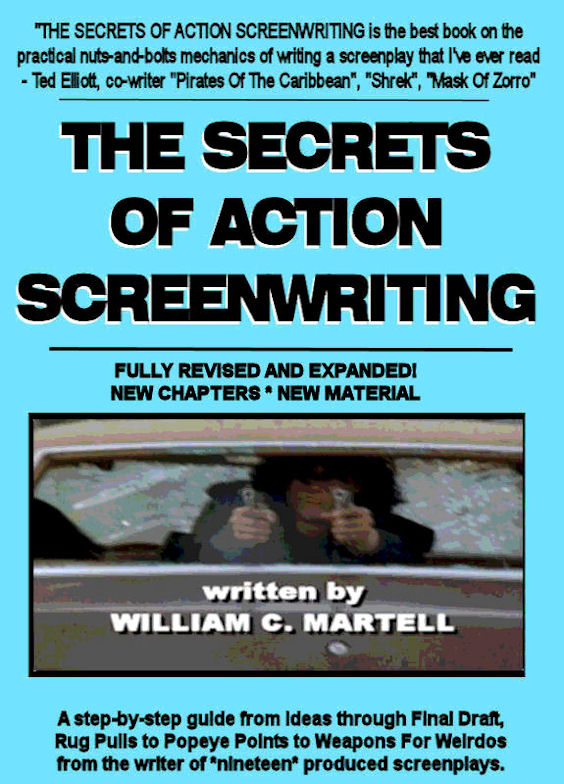
THE BOOK THAT STARTED IT ALL!
*** THE SECRETS OF ACTION SCREENWRITING *** - For Kindle!
*** THE SECRETS OF ACTION SCREENWRITING *** - For Nook!
Why pay $510 for a used version of the 240 page 2000 version that used to retail for $21.95? (check it out!) when
you can get the NEW EXPANDED VERSION - over 500 pages - for just $9.99? New chapters, New examples, New techniques!
"SECRETS OF ACTION SCREENWRITING is the
best book on the practical nuts-and-bolts mechanics of writing a screenplay I've ever read."
- Ted Elliott, co-writer of MASK OF ZORRO, SHREK, PIRATES OF THE CARIBBEAN and the sequels (with Terry Rossio). (ie; 4 of the top 20 Box Office Hits Of ALL TIME.)
Only $9.99 - and no postage!
NO KINDLE REQUIRED! Get the *free* app (any device, except your Mr. Coffee) on the order page on Amazon!
BRAND NEW!
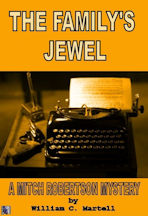
***
MITCH ROBERTSON #2: THE FAMILY'S JEWEL *** - For Kindle!
"The Presidential Suite of the Hollywood Hoover Hotel looked like a bloody battlefield: bodies everywhere, furniture broken, red liquid dripping from the walls, dead soldiers littering the elegant Berber rug as clouds of smoke overhead bounced between two air conditioning vents.
Mitch Robertson stepped over the body of an ex-child star turned sex tape star turned pop star and entered the room, spotted a gun on the floor and picked it up... careful not to spill his coffee with three pumps of mocha syrup from Penny’s Coffee Shop. That coffee was gold, the only thing keeping him going in this dazed state of wakefulness. The gun felt light. Holding it, he saw the silhouette of an 80s action star sitting sideways on a tipped over chair. Motionless. Was he dead? Mitch was still hung over from the Awards Party the night before, and wondered whether this was all some sort of crazy nightmare that he would wake up from... but when he tripped over the brown legs of a bottomless Superhero, flaccid junk encased in a condom but still wearing his mask, and hit the edge of the sofa, gun skittering and coffee spilling, he realized that it was all very real. What the hell had happened here?"
Short Novel. Only 99 cents! - and no postage!
ADVICE FROM 1920!
*** VINTAGE #1: HOW TO WRITE PHOTOPLAYS *** - For Kindle!
***
Screenwriting books have been around as long as films have. This series reprints vintage screenwriting books with a new introduction and history, plus new articles which look at how these lessons from almost 100 years ago apply to today’s screenplays. Anita Loos book is filled with information which still applies.
In addition to the full text of the original book, you get the full screenplay to Miss Loos' hit THE LOVE EXPERT, plus several new articles on the time period and women in Hollywood.
ONLY $2.99 - and no postage!
Tips FAQ

My New Script Secrets Newsletter!


STORY IN ACTION SERIES!

THE MISSION IMPOSSIBLE MOVIES
NEW: Updates On Films 7 & 8 Casting!
All Six Movies analyzed! All of the mission tapes, all of the “that’s impossible!” set pieces and stunts, the cons and capers - and how these scenes work, the twists and double crosses, the tension and suspense (and how to generate it), the concept of each film as a stand alone with a different director calling the shots (broken in the sixth film), the gadgets, the masks, the stories, the co-stars and team members (one team member has been in every film), the stunts Tom Cruise actually did (and the ones he didn’t), and so much more! Over 120,000 words of fun info!
THE MISSION IMPOSSIBLE MOVIES - 347 Pages - Only $3.99 !

BRAND NEW!
*** THE BOURNE MOVIES
NEW: Updates on TREADSTONE TV show!
All five "Bourne" movies (including "Legacy" and it's potential sequels) - what are the techniques used to keep the characters and scenes exciting and involving? Reinventing the thriller genre...
or following the "formula"? Five films - each with an interesting experiment! A detailed analysis of each
of the films, the way these thrillers work... as well as a complete list of box office and critical
statistics for each film. This book is great for writers, directors, and just fans of the series.
Only $3.99 - and no postage!
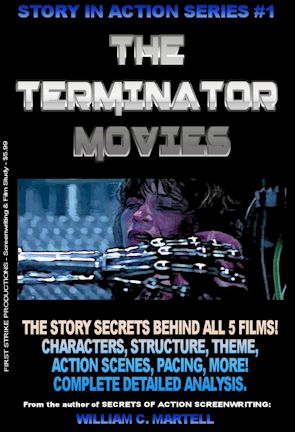
Over 240 pages!
*** THE TERMINATOR MOVIES *** - For Kindle!
He's back! The release of "Terminator: Dark Fate" is set to begin a new trilogy in
the Terminator story... 35 years after the first film was released. What draws us to these films about
a cybernetic organism from the future sent back in time? Why is there a new proposed trilogy every few
years? This book looks at all five Terminator movies from a story standpoint - what makes them work
(or not)? What are the techniques used to keep the characters and scenes exciting and involving? How
about those secret story details you may not have noticed? Containing a detailed analysis of each of
the five films so far, this book delves into the way these stories work... as well as a complete list of
box office and critical statistics for each film. This book is great for writers, directors, and just
fans of the series.
ONLY $3.99 - and no postage!
NO KINDLE REQUIRED! Get the *free* app (any device, except your Mr. Coffee) on the order page on Amazon!
HITCHCOCK FOR WRITERS!
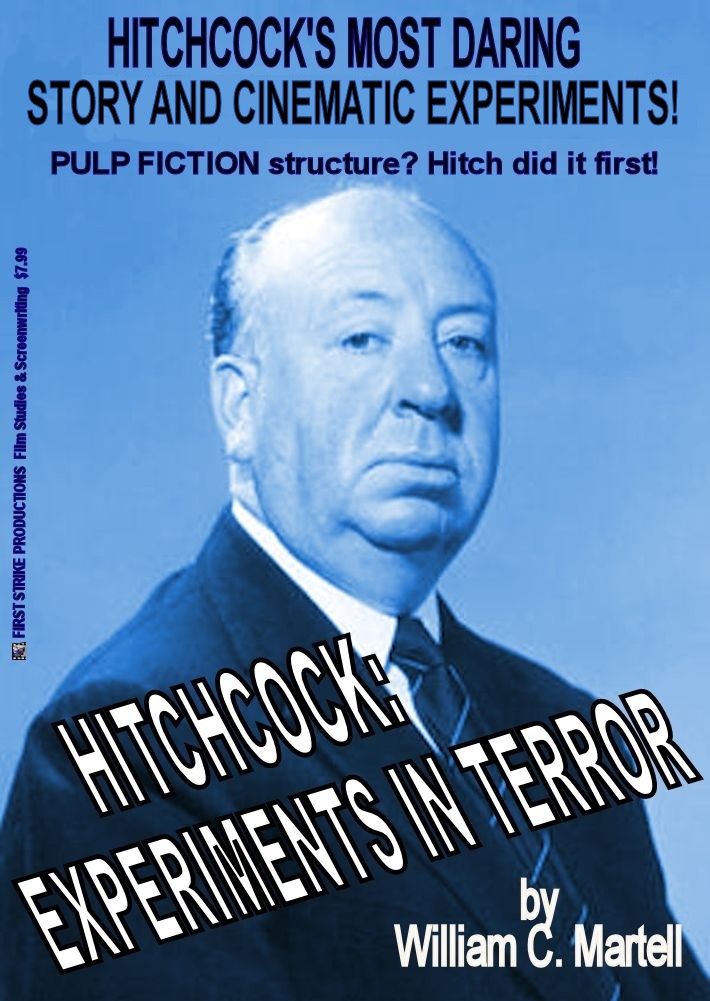
Strange Structures!
*** HITCHCOCK: EXPERIMENTS IN TERROR! *** - For Kindle!
***
Contained Thrillers like "Buried"? Serial Protagonists like "Place Beyond The Pines"? Multiple Connecting Stories like "Pulp Fiction"? Same Story Multiple Times like "Run, Lola, Run"?
HITCHCOCK DID IT FIRST!
This book focuses on 18 of Hitchcock's 52 films with wild cinema and story experiments which paved the way for modern films. Almost one hundred different experiments that you may think are recent cinema or story inventions... but some date back to Hitchcock's *silent* films! We'll examine these experiments and how they work. Great for film makers, screenwriters, film fans, producers and directors.
Only $5.99 - and no postage!
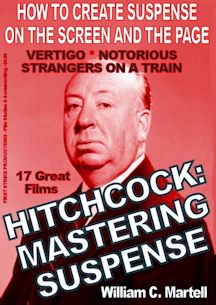
LEARN SUSPENSE FROM THE MASTER!
*** HITCHCOCK: MASTERING SUSPENSE *** - For Kindle!
Alfred Hitchcock, who directed 52 movies, was known as the *Master Of Suspense*; but what exactly is suspense and how can *we* master it? How does suspense work? How can *we* create “Hitchcockian” suspense scenes in our screenplays, novels, stories and films?
This book uses seventeen of Hitchcock’s films to show the difference between suspense and surprise, how to use “focus objects” to create suspense, the 20 iconic suspense scenes and situations, how plot twists work, using secrets for suspense, how to use Dread (the cousin of suspense) in horror stories, and dozens of other amazing storytelling lessons. From classics like “Strangers On A Train” and “The Birds” and “Vertigo” and “To Catch A Thief” to older films from the British period like “The 39 Steps” and “The Man Who Knew Too Much” to his hits from the silent era like “The Lodger” (about Jack The Ripper), we’ll look at all of the techniques to create suspense!
Only $5.99
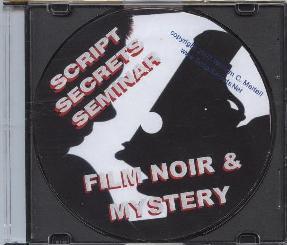
AUDIO CLASS!
NOIR & MYSTERY80 minute CD packed with information on writing Film Noir and Mystery scripts. Using examples from CHINATOWN to OUT OF THE PAST to DOUBLE INDEMNITY you'll learn how to create stories in this dark, twisted genre. How to plant clues, red herrings, suspects, victims, spider women, fallen heroes, the funhouse mirror world of noir supporting characters... and the origins of Film Noir in literature Noir dialogue and how noir endings are different than any other genre. All of the critical elements necessary to write in this critically popular genre.
The Noir & Mystery Class is only $15 (plus $5 S&H). First 20 on Limited Black Disk!
RECESSION SALE! $5 OFF!
IDEAS AND CREATIVITY - 80 minute CD packed with information. Tools to find ideas that are both personal *and* commercial. Hollywood wants scripts with High Concept stories... but not stupid scripts. Developing *intelligent* high concept ideas. How to turn your personal story into a blockbuster - or find your personal story in a high concept idea. Brainstorming and being creative. Ideas and Creativity is $10.00 (plus $5 S&H)
WRITING INDIES - Writing an Indie film? This class covers everything you need to know - from Central Locations to Confined Cameos. Using examples from SWINGERS, THE COOLER, STATION AGENT and others, this 80 minute CD is packed with information. How Indoe films challenge the audience (while mainstream films reassure the audience). Structures, using BOYS DON'T CRY, RUN LOLA RUN, HILARY & JACKIE, and others as example. Writing for a budget, writing for non-actors, getting the most production value out of your budget. Writing Indies is $10.00 (plus $5 S&H)
WRITING HORROR - The essentials of a horror screenplay - what do ROSEMARY'S BABY, NIGHT OF THE LIVING DEAD, THE EXORCIST, BRIDE OF FRANKENSTEIN, THE OTHERS and OPEN WATER have in common? This class will tell you! All of the critical elements necessary to write a script that scares the pants off the audience. Writing Horror is $10.00 (plus $5 S&H).
Click here for more information on CLASS CDs!
THE BLUE BOOKS!
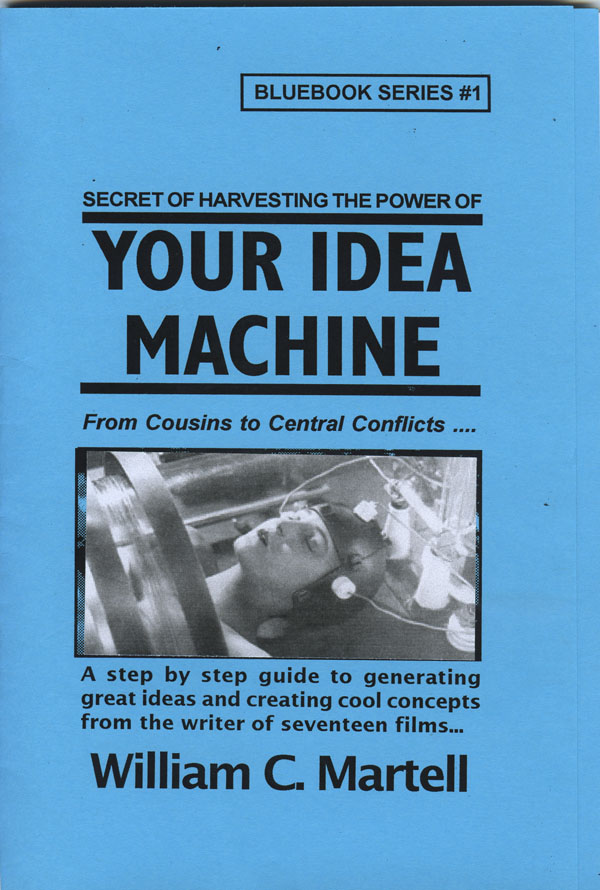
FIND A GREAT IDEA!
*** YOUR IDEA MACHINE *** - For Kindle!
****
Expanded version with more ways to find great ideas! Your screenplay is going to begin with an idea. There are good ideas and bad ideas and commercial ideas and personal ideas. But where do you find ideas in the first place? This handbook explores different methods for finding or generating ideas, and combining those ideas into concepts that sell. The Idea Bank, Fifteen Places To Find Ideas, Good Ideas And Bad Ideas, Ideas From Locations And Elements, Keeping Track Of Your Ideas, Idea Theft - What Can You Do? Weird Ways To Connect Ideas, Combing Ideas To Create Concepts, High Concepts - What Are They? Creating The Killer Concept, Substitution - Lion Tamers & Hitmen, Creating Blockbuster Concepts, Magnification And The Matrix, Conflict Within Concept, Concepts With Visual Conflict, Avoiding Episodic Concepts, much more! Print version is 48 pages, Kindle version is over 175 pages!
Only $4.99 - and no postage!
FIGURE OUT YOUR STORY!
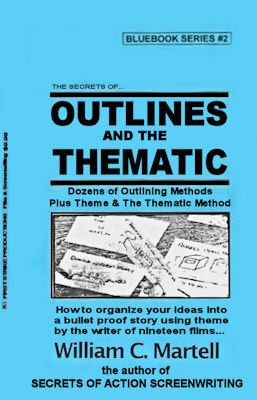
OUTLINES & THE THEMATIC Blue Book.
ARE YOUR SCENES IN THE RIGHT ORDER?
AND ARE THEY THE RIGHT SCENES?
Your story is like a road trip... but where are you going? What's the best route to get there? What are the best sights to see along the way? Just as you plan a vacation instead of just jump in the car and start driving, it's a good idea to plan your story. An artist does sketches before breaking out the oils, so why shouldn't a writer do the same? This Blue Book looks at various outlining methods used by professional screenwriters like Wesley Strick, Paul Schrader, John August, and others... as well as a guest chapter on novel outlines. Plus a whole section on the Thematic Method of generating scenes and characters and other elements that will be part of your outline. The three stages of writing are: Pre-writing, Writing, and Rewriting... this book looks at that first stage and how to use it to improve your screenplays and novels.
Only $4.99 - and no postage!
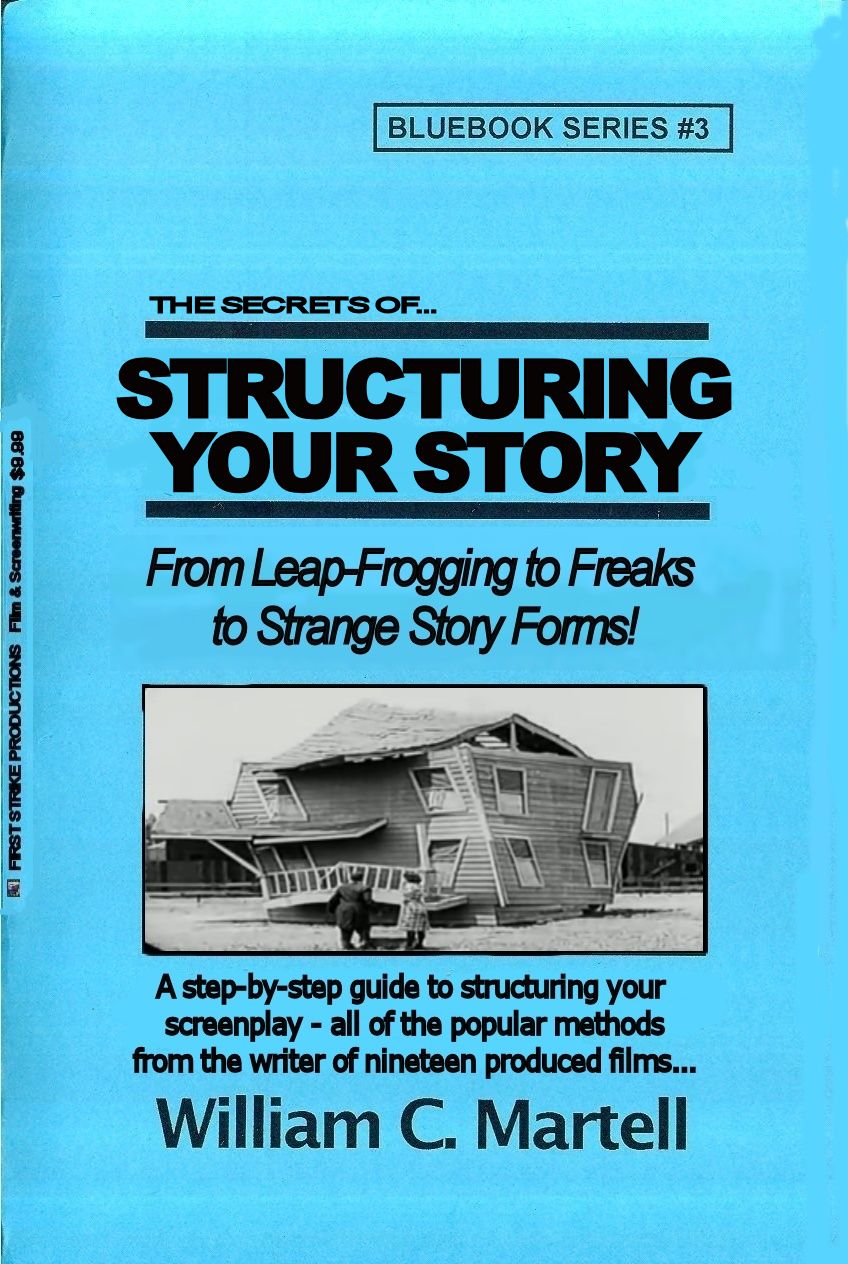
GOT STRUCTURE?!
*** STRUCTURING YOUR STORY *** - For Kindle!
William Goldman says the most important single element of any screenplay is structure. It’s the skeleton under the flesh and blood of your story. Without it, you have a spineless, formless, mess... a slug! How do you make sure your structure is strong enough to support your story? How do you prevent your story from becoming a slug? This Blue Book explores different types of popular structures from the basic three act structure to more obscure methods like leap-frogging. We also look at structure as a verb as well as a noun, and techniques for structuring your story for maximum emotional impact. Most of the other books just look at *structure* and ignore the art of *structuring* your story. Techniques to make your story a page turner... instead of a slug!
Only $4.99 - and no postage!

STORY: WELL TOLD!
*** STORY: WELL TOLD *** - For Kindle!
This book takes you step-by-step through the construction of a story... and how to tell a story well, why Story always starts with character... but ISN'T character, Breaking Your Story, Irony, Planting Information, Evolving Story, Leaving No Dramatic Stone Unturned, The Three Greek Unities, The Importance Of Stakes, The Thematic Method, and how to create personal stories with blockbuster potential. Ready to tell a story?
Print version was 48 pages, Kindle version is over 85,000 words - 251 pages!
Only $4.99 - and no postage!

START STRONG!
*** HOOK 'EM IN TEN *** - For Kindle!
Your story doesn't get a second chance to make a great first impression, and this book shows you a
bunch of techniques on how to do that. From the 12 Basic Ways To Begin Your Story, to the 3 Stars Of
Your First Scene (at least one must be present) to World Building, Title Crawls, Backstory, Starting
Late, Teasers and Pre Title Sequences, Establishing Theme & Motifs (using GODFATHER PART 2), Five Critical
Elements, Setting Up The Rest Of The Story (with GODFATHER), and much more! With hundreds of examples
ranging from Oscar winners to classic films like CASABLANCA to some of my produced films (because
I know exactly why I wrote the scripts that way). Biggest Blue Book yet!
Print version was 48 pages, Kindle version is over 100,000 words - 312 pages!
Only $4.99 - and no postage!
NO KINDLE REQUIRED! Get the *free* app (any device, except your Mr. Coffee) on the order page on Amazon!
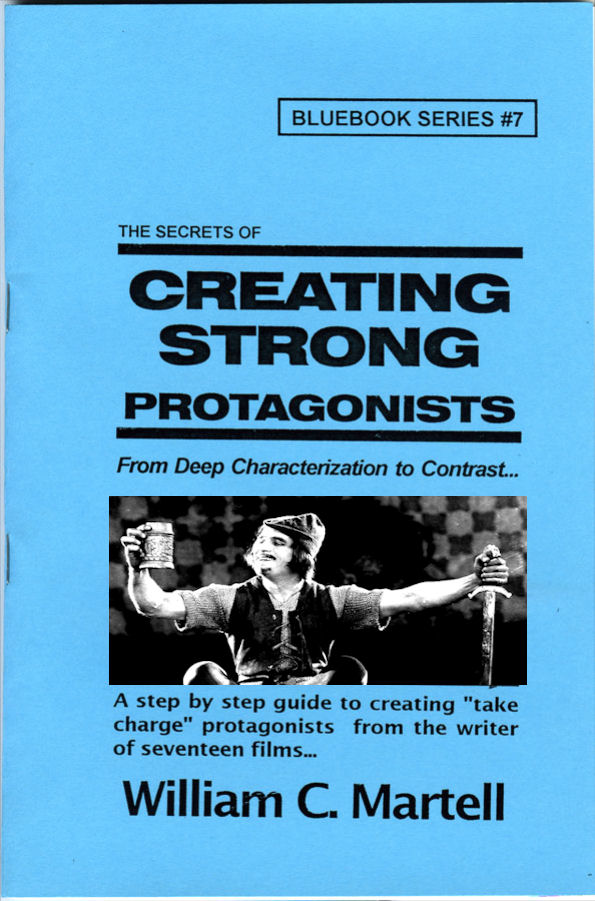
MOVIES ARE CHARACTERS!
*** CREATING STRONG PROTAGONISTS *** - For Kindle!
*** CREATING STRONG PROTAGONISTS *** - For Nook!
Expanded version with more ways to create interesting protagonists! A step-by-step guide to creating "take charge" protagonists. Screenplays are about characters in conflict... characters in emotional turmoil... Strong three dimensional protagonists who can find solutions to their problems in 110 pages. But how do you create characters like this? How do you turn words into flesh and blood? Character issues, Knowing Who Is The Boss, Tapping into YOUR fears, The Naked Character, Pulp Friction, Man With A Plan, Character Arcs, Avoiding Cliche People, Deep Characterization, Problem Protagonists, 12 Ways To Create Likable Protagonists (even if they are criminals), Active vs. Reactive, The Third Dimension In Character, Relationships, Ensemble Scripts, and much, much more. Print version is 48 pages, Kindle version is once again around 205 pages!
ONLY $4.99 - and no postage!
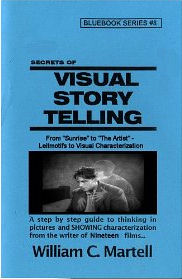
I WRITE PICTURES!
*** VISUAL STORYTELLING *** - For Kindle! (exclusive)
Show Don't Tell - but *how* do you do that? Here are techniques to tell stories visually! Using Oscar Winning Films and Oscar Nominated Films as our primary examples: from the first Best Picture Winner "Sunrise" (1927) to the Oscar Nominated "The Artist" (which takes place in 1927) with stops along the way Pixar's "Up" and Best Original Screenplay Winner "Breaking Away" (a small indie style drama - told visually) as well as "Witness" and other Oscar Winners as examples... plus RISE OF THE PLANET OF THE APES. Print version is 48 pages, Kindle version is over 200 pages!
ONLY $4.99 - and no postage!
DESCRIPTION & VOICE Blue Book!
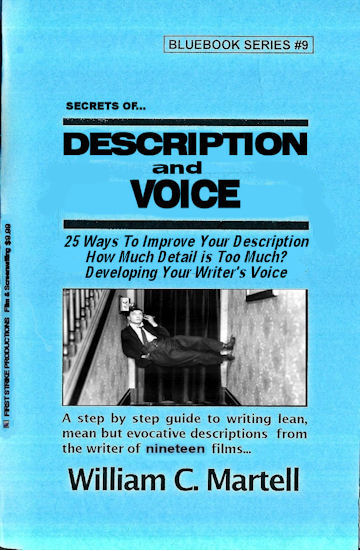
DESCRIPTION & VOICE Blue Book.
IS HALF OF YOUR STORY IN TROUBLE?
Most screenplays are about a 50/50 split between dialogue and description - which means your description is just as important as your dialogue. It just gets less press because the audience never sees it, the same reason why screenwriters get less press than movie stars. But your story will never get to the audience until readers and development executives read your script... so it is a very important factor. Until the movie is made the screenplay is the movie and must be just as exciting as the movie. So how do you make your screenplay exciting to read? Description is important in a novel as well, and the “audience” does read it... how do we write riveting description?
Only $4.99 and no postage!

PRO DIALOGUE TECHNIQUES!
*** DIALOGUE SECRETS *** - For Kindle!
***
Expanded version with more ways to create interesting dialogue! How to remove bad dialogue (and what *is* bad dialogue), First Hand Dialogue, Awful Exposition, Realism, 50 Professional Dialogue Techniques you can use *today*, Subtext, Subtitles, Humor, Sizzling Banter, *Anti-Dialogue*, Speeches, and more. Tools you can use to make your dialogue sizzle! Special sections that use dialogue examples from movies as diverse as "Bringing Up Baby", "Psycho", "Double Indemnity", "Notorious", the Oscar nominated "You Can Count On Me", "His Girl Friday", and many more! Print version is 48 pages, Kindle version is over 175 pages!
Only $4.99 - and no postage!

WHAT IS A SCENE?
*** SCENE SECRETS *** - For Kindle!
***
What is a scene and how many you will need? The difference between scenes and sluglines. Put your scenes on trial for their lives! Using "Jaws" we'll look at beats within a scene. Scene DNA. Creating set pieces and high concept scenes. A famous director talks about creating memorable scenes. 12 ways to create new scenes. Creating unexpected scenes. Use dramatic tension to supercharge your scenes. Plants and payoffs in scenes. Plus transitions and buttons and the all important "flow"... and more! Over 65,000 words! Print version was 48 pages, Kindle version is around 210 pages!
Only $4.99 - and no postage!
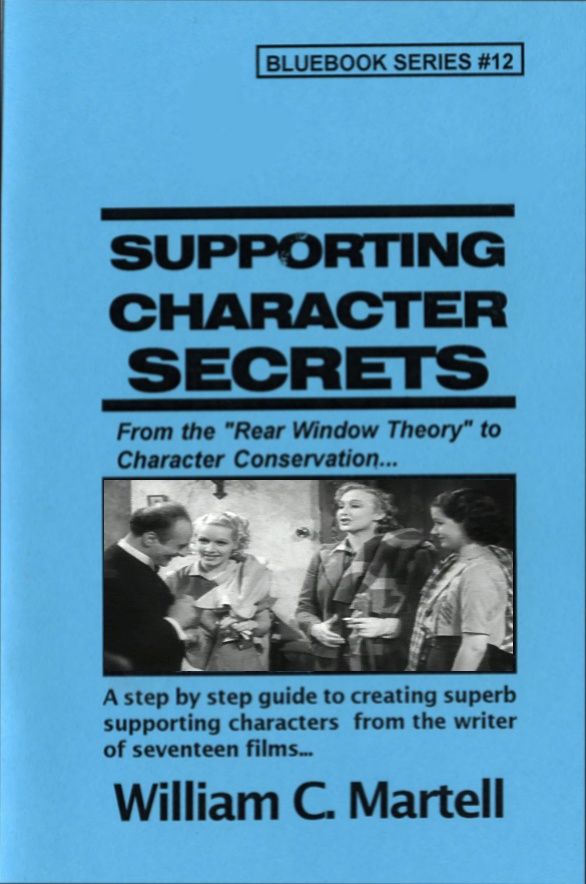
SUBPLOTS?
*** SUPPORTING CHARACTER SECRETS *** - For Kindle! (Exclusive)
Expanded version with more techniques to flesh out your Supporting Characters and make them individuals. Using the hit movie BRIDESMAIDS as well as other comedies like THE HANGOVER and TED and HIGH FIDELITY and
40 YEAR OLD VIRGIN and many other examples we look at ways to make your Supporting Characters come alive on the page.
Print version was 48 pages, Kindle version is around 170 pages!
ONLY $4.99 - and no postage!
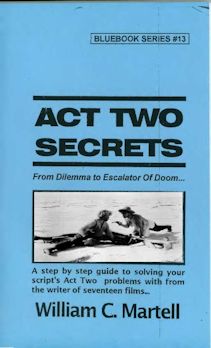
ACT TWO SOLUTIONS!
*** ACT TWO SECRETS *** - For Kindle!
Expanded version with more techniques to help you through the desert of Act Two! Subjects Include: What Is Act Two? Inside Moves, The 2 Ps: Purpose & Pacing, The 4Ds: Dilemma, Denial, Drama and Decision, Momentum, the Two Act Twos, Subplot Prisms, Deadlines, Drive, Levels Of Conflict, Escalation, When Act Two Begins and When Act Two Ends, Scene Order, Bite Sized Pieces, Common Act Two Issues, Plot Devices For Act Two, and dozens of others. Over 67,000 words (that’s well over 200 pages) of tools and techniques to get you through the desert of Act Two alive!
Print version was 48 pages, Kindle version is well over 200 pages!
ONLY $4.99 - and no postage!
BRAND NEW!!
All About Rewrites!
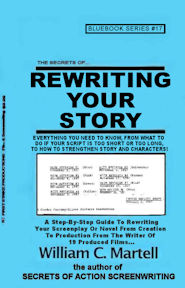
Rewriting In Waves?
*** REWRITES Blue Book! - For Kindle!
The end is just the beginning! You’ve finished your story, but now the rewriting begins! This 405 page book shows you how to rewrite your screenplay or novel to perfection. Everything from Character Consistency to Shoeboxing to How To Give And Receive Notes to 15 Solutions If Your Script’s Too Long! and 15 Solutions If Your Script’s Too Short! to Finding The Cause Of A Story Problem to Good Notes Vs. Bad Notes to Finding Beta Readers to Avoiding Predictability to Learning To Be Objective About Your Work to Script Killer Notes and Notes From Idiots to Production Rewrites and What The Page Colors Mean? and a Complete Rewrite Checklist! The complete book on Rewriting Your Story!
ONLY $4.99 - and no postage!
All About Endings!
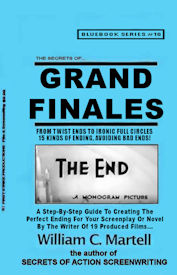
GRAND FINALES Blue Book!
The Perfect Ending For Your Story!
The First Ten Pages Of Your Screenplay Are Critical,
But What About The Last 10 Pages?
Creating the perfect ending to your story! This 100,000 word book shows you how to end your story with a bang, rather than a whimper. Everything from Resolution Order to Act Three Tools to Happy or Sad Endings? to How The Beginning Of Your Story Has Clues To The Ending (in case you were having trouble figuring out how the story should end) to Falling Action to How To Avoid Bad Endings to Writing The Perfect Twist Ending to Setting Up Sequels & Series to Emotional Resolutions to How To Write Post Credit Sequences to Avoiding Deus Ex Machinas, to 20 Different Types Of Ends (and how to write them) and much more! Everything about endings for your screenplay or novel!
Only: $4.99
NO KINDLE REQUIRED! Get the *free* app (any device, except your Mr. Coffee) on the order page on Amazon!
All About LOGLINES, TREATMENTS, and PITCHING!
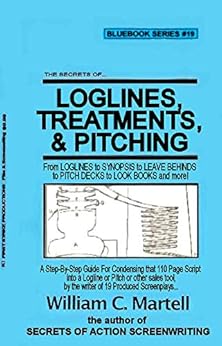
LOGLINES, TREATMENTS, and PITCHING! Blue Book!
Distilling Your Screenplay!
Loglines, Treatments, Pitching, Look Books, Pitch Decks, One Pagers, Rip-O-Matics?
You have written a brilliant 110 page screenplay, but how do you get anyone to read it? You need to distill it down into some form of verbal moonshine or story rocket fuel that will ignite that bored development executive or manager or agent and get them to request your screenplay. But how do you shrink those 110 pages into a 25 word logline or a 2 minute elevator pitch or a one page synopsis or a short paragraph? This 100,000 word book shows you how! Everything you need to know! From common logline mistakes (and how to solve them) to how your pitch can reveal story problems to the 4 types of pitches!
272 Pages - ONLY $4.99!
READY TO BREAK IN?
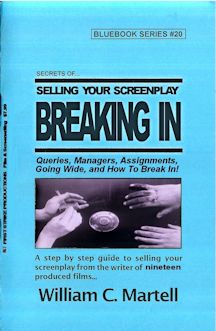
THE BUISINESS SIDE
*** BREAKING IN BLUE BOOK *** - For Kindle!
Should really be called the BUSINESS BLUE BOOK because it covers almost everything you will need to
know for your screenwriting career: from thinking like a producer and learning to speak their language,
to query letters and finding a manager or agent, to making connections (at home and in Hollywood) and
networking, to the different kinds of meetings you are will have at Studios, to the difference between
a producer and a studio, to landing an assignment at that meeting and what is required of you when you
are working under contract, to contracts and options and lawyers and... when to run from a deal!
Information you can use *now* to move your career forward! It's all here in the Biggest Blue Book yet!
Print version was 48 pages, Kindle version is over 400 pages!
$4.99 - and no postage!

Movie Magic Screenwriter is the best selling screenplay formatting software and the choice of Hollywood professionals. Screenwriter automatically formats while you write so you can focus on what you're writing, not where it goes on the page. It also formats for television, stage, novels and comic book scripts so you've got an all in one package for any story you want to write. Academy Award Tech Winner!
* * * Buy It!

|

